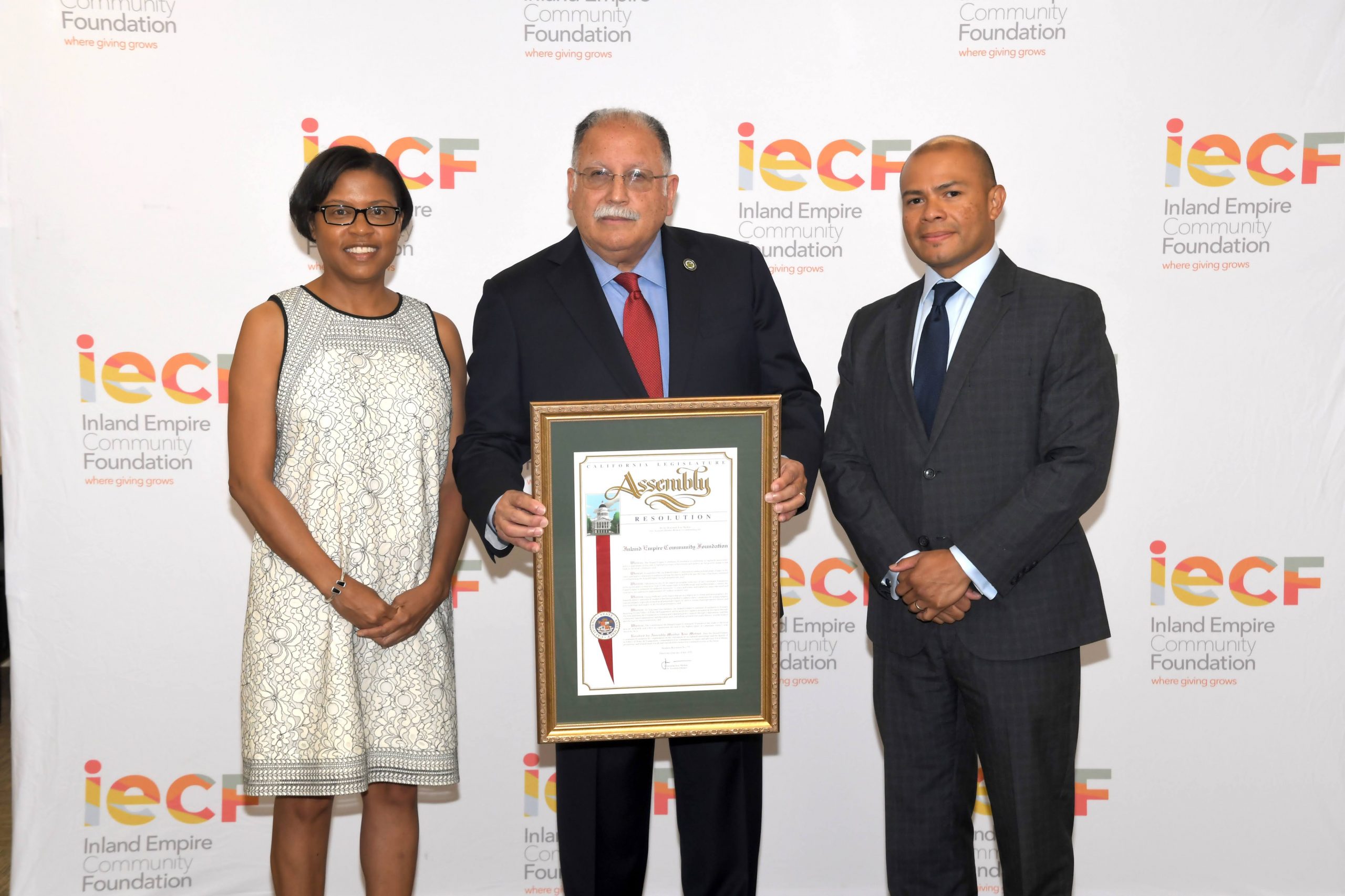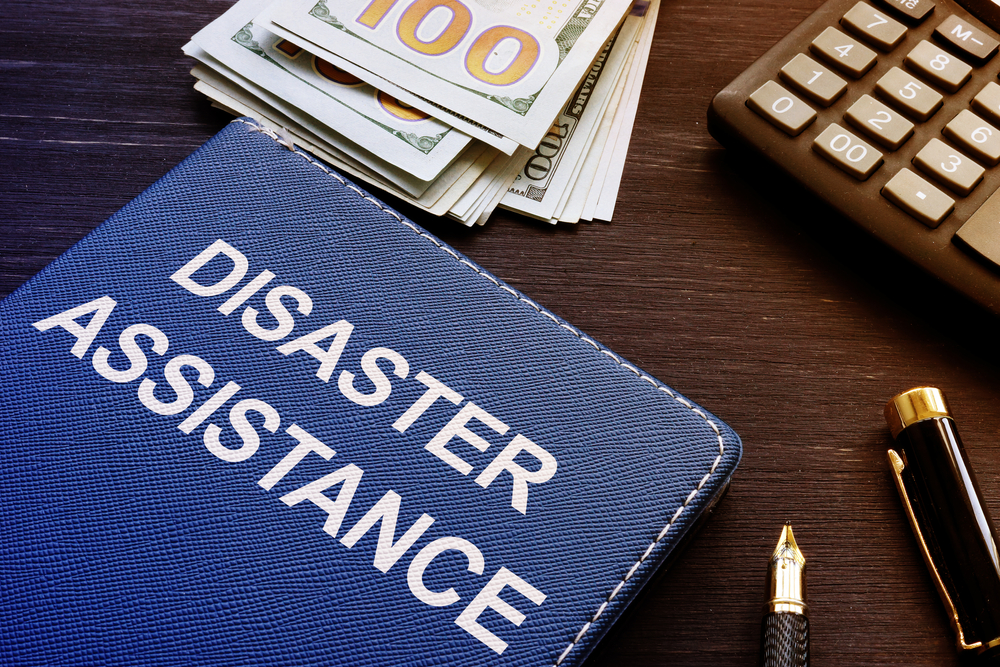Public Service Announcement
Inland Empire Community Foundation Launches New Office of Policy & Engagement to Focus on Regional Priorities Together

The Inland Empire Community Foundation announced on Thursday, July 22, 2021, the launch of its new Office of Policy & Engagement at its virtual event entitled Policy & Engagement Launch: Leading Together in the IE. With over 300 attendees, this unique gathering brought together elected officials, community partners, and philanthropic leaders on the opportunities to build policy capacity to ensure policymakers hear the needs of the IE at the local, state, and federal levels.
“IECF is incredibly thankful to our elected leaders for sharing this platform with us to advocate for a better IE,” said IECF President & CEO Michelle Decker. “This is a time of celebration, yet an important moment for action. Of particular importance is making sure this work is done in partnership with our communities and with a lens of equity.”
Leading with remarks were Assembly Majority Leader Eloise Gómez Reyes (D-San Bernardino), State Senator Rosilicie Ochoa Bogh (R-Yucaipa), and Assemblymember Jose Medina (D-Riverside) who presented IECF with an Assembly Resolution.
“One of the critical areas for impact is directly felt through public policy. Policy that incorporates our shared experiences, our hopes for the future, and solutions to problems that are unique to the Inland Empire,” said Majority Leader Reyes.
Participants also heard from a panel of nonprofit leaders on how tables and coalitions are growing to help different sectors work together on policy issues.
Shared Karen Suarez, Executive Director of Uplift San Bernardino, “We’ve known for a long time that collaboration, coalition-building, and sharing resources are effective and powerful. What I see different and exciting is the energy and passion for this region and the desire to work together.”
The second panel, moderated by IECF Board Member Dr. Dora Barilla, included State Senator Connie M. Leyva (D-Chino), Assemblymember Jose Medina (D-Riverside), San Bernardino County Board of Supervisors Chairman Curt Hagman, and Riverside County Supervisor V. Manuel Perez in discussing the challenges and opportunities with the Inland Empire, and meeting the region’s growing needs for better jobs, housing and educational opportunities for all.
Moving this work also requires investing in regional partnerships and IECF is grateful to the Bill & Melinda Gates Foundation. As a result, grants will go to the first cohort of organizations that were announced during the program. They are: Alianza, Autism Society of Inland Empire, BLU Educational Foundation, Inland Empire Community Collaborative, TODEC, TruEvolution, Congregations Organized for Prophetic Engagement (COPE), Inland Congregations United for Change (ICUC) and Inland Empire Immigrant Youth Collective.
Said Julian Cuevas, IECF’s Director of Policy & Governmental Affairs, “Today’s event is just the formal beginning of this work. There will be workshops and strategy sessions announced soon as we prepare for the 2022 legislative and budget cycle. The goal is to have tangible asks by the fall, and pipelining them to our elected officials.”
Public Service Announcement
Inaugural “Persons with Disabilities Workforce Summit”: A Movement Towards Inclusivity and Opportunity

The IE Chamber takes the lead shaping an Inclusive Future in the Workforce for Persons with Hidden Talents.
The Inland Empire Regional Chamber of Commerce proudly announces the inaugural “Persons with Disabilities Workforce Summit,” a pivotal event set to redefine the narrative around disabilities in the workplace. This summit, more than just an event, marks the beginning of a movement towards inclusivity, recognizing the untapped potential within our diverse community. Scheduled for April 8, 2024, at the Jessie Turner Events Center in Fontana, this transformative experience invites us to change our perspectives on abilities and disabilities, igniting a wave of positive change across the workforce.
Why Attend?
This summit is an unparalleled opportunity to:
- Discover Hidden Gems: Uncover the extraordinary skills and talents of individuals with chronic illnesses, challenging the conventional ‘disabled’ label.
- Transform Perspectives: Shift from viewing individuals as ‘disabilities’ or ‘liabilities’ to recognizing them as ‘hidden talents’ and ‘opportunities.’
- Foster Inclusive Growth: As the Inland Empire continues to thrive, it’s essential to embrace every community member, especially those sidelined due to chronic illnesses.
- Network & Collaborate: Engage with business leaders and academic professionals pioneering inclusive practices within their organizations.
- Educate & Innovate: Learn strategies to integrate individuals with disabilities into your workforce, enriching your organization with diverse perspectives and skills.
Who Should Attend?
Business owners, academic leaders, HR professionals, and anyone passionate about creating an inclusive workplace will find immense value in attending this summit.
A New Perspective on Abilities
The Inland Empire Regional Chamber of Commerce is honored to provide a platform for Mr. Eddy Sumar, Founder of ERS Consulting Services, and Ms. Natalie Boehm, President of The Defeating Epilepsy Foundation. They will inaugurate the first edition of “Empowering Persons with Hidden Talents—A New Perspective on Abilities,” a vision also championed by Mr. Sumar in his role as the IERCC’s Chair of Education.
This vision was inspired by a visit to the Multisensory International School in Lusaka, Zambia, where Mr. Sumar encountered students with unique talents, prompting a shift in terminology from “persons with disabilities” to “persons with hidden talents.” This perspective celebrates the diverse abilities and potential within each individual, aiming to foster a more inclusive and dynamic future.
Notable Speakers
The summit will feature esteemed speakers, including California State Treasurer Fiona Ma, California Workforce Board Chairman Angelo Farooq, and Fontana Mayor Acquanetta Warren, among others. These leaders will share insights and strategies to support the integration and empowerment of individuals with hidden talents within the workforce.
Join the Movement
The Inland Empire Regional Chamber of Commerce, along with Mr. Eddy Sumar, Ms. Natalie Boehm, and a host of distinguished speakers, invite you to become co-authors of this new narrative. Let’s come together to celebrate, empower, and harness the hidden talents within our community, paving the way for a more inclusive and vibrant future.
The “Persons with Disabilities Workforce Summit” is more than an event—it’s the beginning of a transformative journey. Be a part of this movement on April 8, 2024, and help shape a future where every talent is recognized and valued.
For more information and to register for the summit, visit the Inland Empire Regional Chamber of Commerce website at www.iechamber.org or visit the event website at talent.iechamber.org. Together, we can make a difference. It truly takes a village to raise a child, and it takes a community to build a future where everyone is empowered to reach their fullest potential.
Public Service Announcement
San Bernardino County declares State of Emergency

San Bernardino County declared a state of emergency tonight in anticipation of extreme rain and snow expected today through Wednesday.
“This declaration puts the state and federal government on notice that our residents will need their help,” said Board of Supervisors Chair and Third District Supervisor Dawn Rowe. “The County is taking all available steps to keep our residents safe and we are making preparations to meet their needs during and after the storms. I urge everyone to take necessary precautions, avoid unnecessary travel, and visit Prepare.SBCounty.gov for vital safety information.”
The proclamation was signed by County CEO Luther Snoke in his capacity as the County’s Director of Emergency Services and will be submitted to the Board of Supervisors for ratification.
The County sent out phone and text warnings in English and Spanish today warning residents about the potential for flooding and mudslides. The County will continue to post warnings and safety information on its social media platforms.
The County has crews and equipment in position to be activated as needed.
The National Weather Service has predicted catastrophic and life-threatening flooding for the San Bernardino valley and coastal slopes of the San Bernardino mountains tonight through Tuesday with showers chances lasting through Friday. Travel and commuting will be difficult.
Small stream and urban flooding will occur and rivers are expected to rise.
The County’s emergency declaration clears the way for state and federal assistance that will likely be needed to assist the county in coping with the storms and their aftermath.
Today the Governor also declared a state of emergency for eight counties, including San Bernardino County.
Business
SBA Amends Disaster Declaration for California

Disaster Assistance Now Available to Private Nonprofit Organizations in Six Additional Counties
Low-interest federal disaster loans are now available to certain private nonprofit organizations in Alameda, Imperial, San Joaquin, San Bernardino, Stanislaus, and Ventura counties following the amendment to President Biden’s April 3, major disaster declaration for Public Assistance as a result of severe winter storms, straight-line winds, flooding, landslides and mudslides that occurred Feb. 21 – July 10, 2023, announced Administrator Isabella Casillas Guzman of the U.S. Small Business Administration. Private nonprofits that provide essential services of a governmental nature are eligible for assistance.
These low-interest federal disaster loans are available in Alameda, Alpine, Amador, Butte, Calaveras, Del Norte, El Dorado, Fresno, Glenn, Humboldt, Imperial, Inyo, Kern, Kings, Lake, Los Angeles, Madera, Marin, Mariposa, Merced, Modoc, Mono, Monterey, Napa, Nevada, Plumas, Sacramento, San Benito, San Bernardino, San Francisco, San Joaquin, San Luis Obispo, Santa Barbara, Santa Clara, Santa Cruz, Shasta, Sierra, Solano, Sonoma, Stanislaus, Trinity, Tulare, Tuolumne and Ventura counties in California.
Although the deadline to apply for a disaster loan for physical damages was June 5, private nonprofits in Alameda, Imperial, San Joaquin, San Bernardino, Stanislaus and Ventura counties may apply with an explanation that they were not eligible until this July 25, amendment to the declaration.
SBA may lend private nonprofits up to $2 million to repair or replace damaged or destroyed real estate, machinery and equipment, inventory and other business assets. SBA can also lend additional funds to help with the cost of improvements to protect, prevent or minimize the same type of disaster damage from occurring in the future.
For certain private nonprofit organizations of any size, SBA also offers Economic Injury Disaster Loans to help meet working capital needs caused by the disaster. Economic Injury Disaster Loans may be used to pay fixed debts, payroll, accounts payable and other bills that cannot be paid because of the disaster’s impact. Economic injury assistance is available regardless of whether the private nonprofit suffered any property damage.
The interest rate is 2.375 percent with terms up to 30 years. The deadline to apply for property damage is June 5, 2023. The deadline to apply for economic injury is Jan. 3, 2024.
Applicants may apply online, receive additional disaster assistance information and download applications at https://disasterloanassistance.sba.gov/. Applicants may also call SBA’s Customer Service Center at (800) 659-2955 or email disastercustomerservice@sba.gov for more information on SBA disaster assistance. For people who are deaf, hard of hearing, or have a speech disability, please dial 7-1-1 to access telecommunications relay services. Completed applications should be mailed to U.S. Small Business Administration, Processing and Disbursement Center, 14925 Kingsport Road, Fort Worth, TX 76155.
-

 Opinion1 month ago
Opinion1 month agoSurge in Unemployment Among California Youth Linked to Minimum Wage Hikes
-

 Commercial Real Estate Transactions3 weeks ago
Commercial Real Estate Transactions3 weeks agoSRS Real Estate Partners Announces Record-Breaking $6.15 Million Ground Lease Sale of a New Construction Chick-fil-A Property in Murrieta, California
-

 Health & Wellness3 weeks ago
Health & Wellness3 weeks agoBuddha Bars: A Mother’s Innovative Solution to Healthy Snacking
-
By Press Release1 week ago
California Employment Expansion Continues But Still Trails Nation




